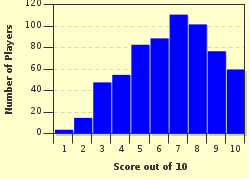Quiz Answer Key and Fun Facts
1. Paul Langerhans will be remembered for having lent his name to describe an islet. Where is this islet located?
2. The name of Julius Caesar is famous in history and his name has given rise to many words in the English language. Which of the following words is NOT named after the famous Roman leader?
3. 'Martinet' is a term used to describe a disciplinarian. From whose name did this term originate?
4. John McAdam was a Scottish engineer. Which of the following words in the English language is derived from his name?
5. The Morse code is a very popular telegraphic code named after Samuel Morse. Do you know what his profession was?
6. Juan de Bermudez was a Spanish navigator who discovered an island and lent his name to the island. Can you guess which islands did he discover?
7. The saxophone is a musical instrument designed by a Belgian musician called Antoine Sax.
8. Hassan-ibu-al-Sabbah was a Persian missionary who headed a fanatical sect. Do you know which word in the English language is derived from his name?
9. Fibonacci was an Italian mathematician after whom the famous Fibonacci sequence is named. Do you know which of the following is the Fibonacci sequence?
10. The London policeman is known as a 'bobby'. From whose name is this word derived?
Source: Author
deepakmr
This quiz was reviewed by FunTrivia editor
agony before going online.
Any errors found in FunTrivia content are routinely corrected through our feedback system.


